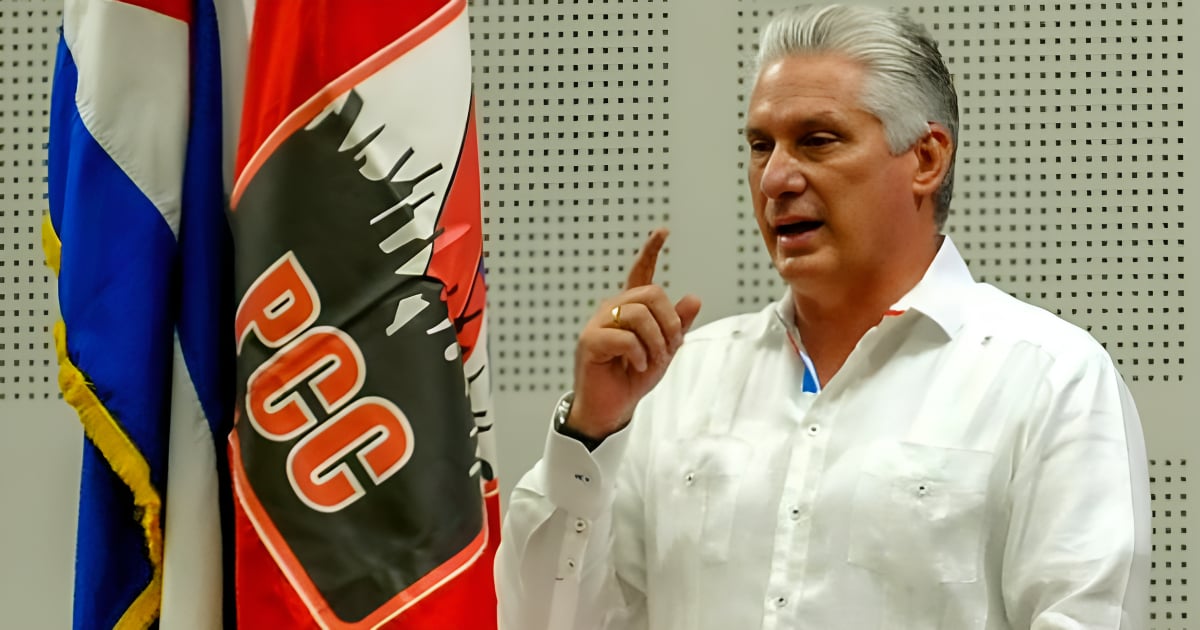Amid widespread public discontent over the recent price hike announced by state-run ETECSA, the Communist Party of Cuba (PCC) has issued a confrontational message reminiscent of previous repressive tactics. The statement, disseminated via the PCC's social media channels, urged supporters to "defeat the extreme reaction," clearly targeting the recent wave of protests led primarily by university students.
This message comes directly from Miguel Díaz-Canel, who, as the first secretary of the one-party state, signals an explicit political directive from the highest levels of power. It echoes past "combat orders" issued by the government, aligning with the rhetoric famously used by the late dictator Fidel Castro. "Remember what history teaches us: these revolutionary processes have no middle ground; they either succeed entirely or are defeated," the message reads, thinly veiling a call to action against any dissent.
Díaz-Canel's assurance that "we will not be counted among the defeated" revives an internal conflict mindset that criminalizes disagreement, shuns dialogue and consensus, and divides the populace into "winners and losers." This stance reinforces both ideological and physical repression against those who dare to question the regime's decisions.
This call to arms mirrors the "combat order" Díaz-Canel issued on July 11, 2021, during the largest citizen demonstrations in Cuba's recent history. At that time, he publicly urged "revolutionaries" to take to the streets to confront citizens peacefully protesting against economic hardships and lack of freedoms. "The combat order is given, revolutionaries to the streets," he declared on national television, labeling protesters as instigators and "confused."
Recurrent Patterns Under New Circumstances
In recent days, the public, particularly the youth, has expressed outrage over ETECSA's price increase, which directly impacts internet access and communication—essential tools for social and political expression in today's context. The new rates are seen as exorbitant and disproportionate to the citizens' purchasing power, already strained by a severe economic crisis.
Instead of re-evaluating these unpopular measures, the Cuban regime has chosen to mobilize its repressive apparatus, deploying State Security agents to universities nationwide. Rather than acknowledging the discontent as a warning signal and adjusting policies, the government has reactivated its internal warfare rhetoric, once again blaming the "counter-revolution" for inciting the protests.
Simultaneously, the regime has staged symbolic acts, such as promoting Lázaro Alberto Álvarez Casas to Army Corps General, with a public appearance by the aging dictator Raúl Castro. This strategy not only delegitimizes citizen demands but also justifies a repressive response under the guise of "defending the revolution."
Implications of the PCC's Directive
The seriousness of the PCC's message lies in its nature as a political directive rather than mere ideological posturing. Historically, such pronouncements have been followed by the deployment of the state's repressive machinery. An initial outburst from a zealous party member or a state-run media outlet often precedes the full-scale mobilization of this apparatus.
When the PCC's first secretary—Cuba's most powerful political figure and head of the only legal party recognized by the regime's Constitution—calls for confrontation against those expressing discontent, the immediate result often includes heightened surveillance, police repression, arbitrary detentions, and harassment of activists, journalists, and ordinary citizens.
Although the message does not directly reference ETECSA's price hike, it is undeniably a response to the wave of protests gaining traction in universities and on social media. The warlike, ideological language of Castro's legacy, used by the leader of the so-called "continuity," underscores that, for the regime, criticism is not part of public discourse but a threat to be silenced.
The situation is alarming: faced with a citizenry increasingly informed and fed up with empty promises, the regime responds with trench warfare rhetoric, shutting down dialogue and reinforcing social control. Instead of rectifying course, the Cuban totalitarian regime bets once again on fear and state terrorism.
Key Questions on Cuba's Political Climate
What sparked the recent protests in Cuba?
The protests were triggered by a significant price hike by ETECSA, Cuba's state-run telecommunications provider, which exacerbates the already difficult access to internet and communication.
How has the Cuban government responded to these protests?
The Cuban government has responded by issuing confrontational messages, deploying state security agents, and reinforcing its repressive machinery against protestors and dissidents.
Who is leading the current protests in Cuba?
The protests are primarily led by university students who have been at the forefront of expressing dissatisfaction with the government's policies.
